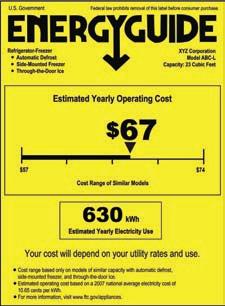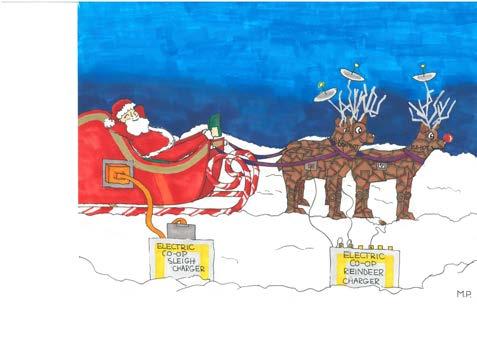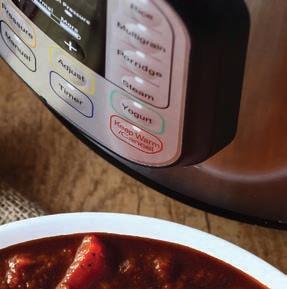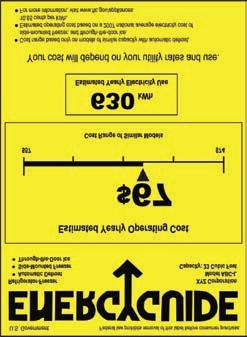
24 minute read
Co-op News
CUSTOM BLINDS, SHADES, SHUTTERS & DRAPERY
New Year – New Look! Celebrate SAVINGS in Style!
Advertisement
Ask About The Benefi ts Of Layering With Drapery


Cellular Shades


Woven Woods

Shutters
Call To Schedule Your FREE In-Home Design Consultation or visit 1-877-892-4537 www.3DayOffer835.com
HURRY! Limited Time Off !
on Custom Blinds, Shades & Drapery BUY 1 GET 1 OFF 50 % *



A Fresh Start




A MESSAGE FROM YOUR CEO VARZAVAND “AVAN” IRANI
THere’s a certain poetry to opening a pristine calendar each January. THe clean slate, absent scribbled-in appointments and obligations, encourages reflection and a bit of personal accounting. Rather than lack, the calendar’s empty grid represents promise—the potential for a fresh start in a new year.
Of course, this month, that sense of possibility is accentuated as we embark on not just a new year but a new decade. It’s an especially opportune moment to think about habits and practices that we may want to change, maintain or cultivate.
At NEC Co-op Energy, we like to take stock in the same way. Each year presents 365 (or 366 this leap year) new opportunities to earn our members’ trust and business, and January 1 is a good time for all of us here to think about the best ways to do that.
As you know, the co-op’s most fundamental mission is to provide you the best possible electric service at the lowest possible cost. THat’s what our staff members—from employees at the front desk to warehouse personnel and from the engineering department to our human resources team and everyone in between—dedicate themselves to, year in and year out. For their dedication, I’d like to express my gratitude. All of them come to work each day with the safe provision of service to our members foremost in mind. Our board of directors deserves a big thank-you, too. THe NEC board members have taken on the weighty responsibility of running a multimillion-dollar utility. THe commitment they display in keeping up with the changing regulatory, technological and legislative landscapes that affect our industry is laudable. Decisions made by the board aren’t undertaken lightly, as directors know that the outcomes of those choices affect thousands of their fellow members. THeir diligence is appreciated, and I strive every day to emulate their conscientiousness.
A final thank-you goes to you, our members, who make all our jobs possible. Your support and understanding when things don’t go right, and your input, whether via suggestion, compliment or complaint, helps us do a better job for you.
Without you, there would be no cooperative. For you, for this co-op and for ourselves, you can count on us at NEC to do our best to be worthy beneficiaries of 2020’s bounty and promise. BYCHYKHIN_OLEXANDR | ISTOCK.COM


WE RESOLVE TO DAVE SHAFER
Provide you with the most reliable electric service possible. Keep our rates as low as possible. Provide friendly and efficient customer service at all times. Never forget that you are a member-owner of this cooperative.
Happy new year from the directors and employees of YOURNAME Electric Cooperative.
Our offices will be closed Wednesday, January 1, for the holiday.
Don’t Wait: Be Prepared Before the Storm
It’s your worst-case scenario. A major storm was predicted, and this time the predictions were right. Power lines are down, and your electricity may be out for several days. You’re low on everything: food, pet supplies, toilet paper, batteries, diapers and medication.
Imagine how you would feel in this situation. While you can’t predict which weather forecast will come to pass, you can plan ahead so when severe weather strikes, you have the tools and resources to effectively weather the storm. THe Department of Homeland Security offers several resources to help you prepare for major weather events and natural disasters at ready.gov/make-a-plan.

Preparedness Actions • Keep your pantry stocked with a three-day supply of nonperishable food, such as canned goods, energy bars, peanut butter, powdered milk, instant coffee, water and other essentials, such as diapers and toiletries. • Confirm that you have adequate sanitation and hygiene supplies, including towelettes, soap and hand sanitizer. • Ensure your first-aid kit is stocked with pain relievers, bandages and other medical essentials, and keep prescription medications filled and up to date. • Set aside basic household items you will need, including flashlights, batteries, a manual can opener, and battery-powered radio or TV. • Organize emergency supplies so they are together in an easily accessible location.
With Advance Warning If a severe storm is predicted, fully charge all cellphones, laptops and devices so you have maximum power in the event of a power outage.
If you plan to use a small generator, make sure it’s rated to handle the amount of power you will need, and always review the manufacturer’s instructions to operate it safely. Never use a generator indoors or near doors or windows.
During a Prolonged Outage In the event of an outage, turn off appliances, TVs, computers and other sensitive electronics. THis will help avert damage from a power surge and will keep circuits from overloading during power restoration. THat said, do leave one light on so you will know
when power is restored.
If utilizing a small household generator, consider using LED holiday lights to illuminate a living area. A strand of 100 white lights draws little energy yet produces considerable light. Solar lights also work, if they can receive some sunlight during the day for charging.
During thunderstorms, the American Red Cross recommends avoiding electrical equipment and landline phones. Use cellphones, battery-powered TVs and radios instead. Keep away from windows. Listen to local news or an emergency weather radio for emergency updates, and check Nueces Electric Cooperative’s social media for restoration updates.
After the storm, avoid downed power lines and flooded areas where power lines could be submerged. Allow ample room for utility crews to safely perform their jobs—including on your property. RAPIDEYE | ISTOCK.COM

Power in Planning Mindful planning for severe storms or other emergencies can reduce stress and anxiety caused by the weather event and can lessen the impact of the storm’s effects. Sign up for emergency alerts from the National Oceanic and Atmospheric Association and install Nueces Electric Cooperative’s app on your phone to stay abreast of restoration efforts and other important co-op news and information.
Prepare today because there is power in planning.

Simple Steps for Winter Safety
Electricity has an important, everyday role in our lives. But it’s equally important to never get complacent around this powerful force. Keep the following safety tips in mind as winter’s chill enters your home.
Space heaters should be used sparingly and safely. Always follow the manufacturer’s operating recommendations and keep them several feet away from all flammable objects. Heaters may require occasional cleaning, which can be done by first unplugging the heater and simply vacuuming to remove dust. Do not dismantle the heater for cleaning.
Electric blankets should be checked for damage before use. Look for kinks, worn wires, scorch marks or breaks in the heating element. Remember, electric blankets have a limited life, and if there is any doubt about the safety of yours, replace it.
Don’t tangle with tingles. If you receive electric shocks or tingles from an appliance, turn it off, unplug it, do not use it, and discard it or get it checked out immediately. If a switch or plug plate is warm to the touch or discolored, don’t use it. Have it—and your entire home’s electric system—checked out by a qualified electrician and make necessary repairs. Flickering lights and buzzing sounds can also indicate issues that need to be addressed.
Smoke and carbon monoxide detectors should be tested and the batteries replaced at least twice a year to make sure they are working properly.
Surge protectors should be used for all valuable electronics. And if the holidays brought additional computers, TVs and other electrical devices into your home, be sure not to overload electrical circuits.
Home fires are far more common in winter months due to drier air and other conditions.Exercise extra caution around anything flammable and make sure you have appropriate working fire extinguishers in the kitchen, garage and other areas where fire risk is higher. You should also have an escape plan for your family in the event of a fire.
Resolve To Help Others THis Year and Yourself Most New Year’s resolutions benefit us. If we quit smoking, lose weight or exercise more, for example, we get healthier and, often, happier. THis year, add a resolution that helps others, too: Volunteer in your community. Volunteering benefits your chosen cause, but you’ll also get something in return. Volunteers gain leadership experience, learn new skills and make new friends. Plus, the sense of satisfaction you gain from serving others—and affecting their lives—can reduce stress, lift your mood and make you feel productive and engaged.
Volunteering is a fun and easy way to explore your interests and passions. Volunteer work can be a relaxing yet energizing escape from your day-to-day routine.
Helping others doesn’t have to take over your life to be beneficial. In fact, research shows that just two to three hours per week, or about 100 hours a year, can confer the most benefits—to you and your chosen cause. THe important thing is to devote only the amount of time that feels comfortable to you. Volunteering should feel like a fun and rewarding hobby, not another chore on your to-do list.

Understanding the EnergyGuide Label


EnergyGuide labels have been around for four decades and are just as important today to help you buy energy-efficient appliances as they were when they were first introduced. You’ll find these useful tags on air conditioners, clothes washers, dishwashers, freezers, furnaces, heat pumps, pool heaters, refrigerators, TVs, water heaters and window AC units. You’ll also often see a second, blueand-white Energy Star label applied to a much broader range of products that identifies its bearer as being more efficient than most of its peers. For appliances, the standard a product must reach varies. An Energy Star dishwasher, for example, must be 10% more efficient than the least efficient unit, while washing machines must be 37% more efficient.
When you’re shopping for appliances, consider items as having two price tags. THe first one covers the purchase price—think of it as a down payment. THe second price tag is the cost of operating the appliance during its lifetime. You’ll be paying the second price every month with your utility bill for the next 10–20 years, depending on the appliance. Refrigerators last an average of 12 years; clothes washers last about 11 years; and room air conditioners last about nine years.
When shopping, consider labels and features that can help ensure that you purchase appliances with a low operating cost. THe EnergyGuide label is a great tool that helps consumers compare the energy use and costs of new appliances. Use this guide to better understand how to interpret the information found on the label. • Key features of the appliance and the similar models that make up the cost range below this section of the label. • THe cost range helps you compare the energy use of different models by showing you the range of operating costs for models with similar features. • An estimate of how much electricity the appliance uses in a year based on typical use. Multiply this by the electricity rate on your utility bill to better judge what your actual operating cost might be. • THe make, model and size tell you exactly what product this label describes. • What you might pay to run the appliance for one year, based on its electricity use and the national average cost of energy. THe cost appears on labels for all models and brands so you can compare energy use. If you see the Energy Star logo, it means the product is better for the environment because it uses less electricity than standard models. Understanding the ENERGYGUIDE Label The cost range helps you compare the energy use of di erent models by showing you the range of operating costs for models with similar features. The make, model and size tell you exactly what product this label describes.
What you might pay to run the appliance for one year, based on its electricity use and the national average cost of energy. The cost appears on labels for all models and brands so you can compare energy use. If you see the ENERGY STAR logo, it means the product is better for the environment because it uses less electricity than standard Source: Federal Trade Commission The ENERGYGUIDE label is a great tool that helps consumers compare the energy use and costs of new appliances. Use the sample below to better understand how to use the information found on the label. Lists key features of the appliance and the similar models that make up the cost range below. An estimate of how much electricity the appliance uses in a year based on typical use. Multiply this by your local electricity rate on your utility bill to better judge what your actual operating cost might be. If you see the ENERGY STAR logo, it means the product is better for the environment because it uses less electricity than standard models.
Ramiro De La Paz Memorial Scholarship Each year, Nueces Electric Cooperative awards college scholarships to high school seniors of cooperative members. Application Deadline: February 11, 2020
There are three different types of applications that will be available for these scholarship funds: Students planning to attend a 4-year college or university in Texas can win one of (10) $1,000 scholarships or one of two (2) $2,000 scholar ships, students planning to attend a two-year or vocational college in Texas can win one of (2) $2,000 scholarships, and students planning to attend an accred ited Texas lineman’s college can win one of (2) $5,000 scholarships.

For Applications & Details: www.nueceselectric.org & www.neccoopenergy.com All applicants must reside in the home with a parent or legal guardian who has been an NEC member for a minimum of six months as of the application deadline date.
Two $4,000 scholarships and Ten $1,000 scholarships and Two $2,000 scholarships and Two $5,000 scholarships
Youth Leadership Tour 2020 Win the trip of a lifetime! Youth Leadership Tour

The Govenment-in-Action Youth Leadership Tour 2020 is an all-expense-paid trip for high school juniors to learn about different aspects of the government, meet their members of Congress and visit historical sites. This year, NEC will send two delegates from the cooperative to participate. This year’s trip will begin in Austin, Texas on Wednesday, June 17 and continue on to tour sites in Washington D.C. before the trip concludes on Friday, June 26. Essay Topic: Summer is one of the hottest times of the year, it is also a time when we use the most energy. What are some ways you can conserve energy at home during the summer? Application Deadline: January 14, 2020 The travel package, valued at more than $3,000, includes air transportation to and from Washington D.C., hotel stay, meals, admission fees, and $250 cash for extra expenses. PLUS: Each winner will also receive a $1,000 scholarship, should they attend an accredited Texas college or University. The Govenment-in-Action Youth Leadership Tour 2020 is an all-expense-paid trip for high school to learn about different aspects of the This year, NEC will send two delegates from the cooperative to participate. This year’s trip will begin in Austin, Texas on Wednesday, June 17 and continue on to tour sites in Washington D.C. before the trip concludes on Friday, June 26. The travel package, valued at more than $3,000, includes air transportation to and from Washington D.C., hotel stay, meals, admission fees, and $250 cash for extra
Juniors - Apply Today! How to apply: Complete the 2020 Nueces Electric Cooperative Youth Leadership Tour Application form which can be found on both nueceselectric.org and neccoopenergy.com. Submit a 400-600 word essay on the topic “Summer is one of the hottest times of the year, it is also a time when we use the most energy. What are some ways you can conserve energy at home this summer?“
Christmas Card Contest 2020
RULES: Entries must be hand-drawn and follow the contest theme of combining electricity or lineworkers with a Christmas or holiday component. All entries must be received by 5 p.m. on Thursday, January 23, 2020.
All submitted works must be an original concept and not a copy of anyone else’s copyrighted material. If your image infringes upon another’s copyright, it will be disqualified. Upon submitting your work to NEC for this contest, you are solely responsible for any infringement on copyrighted materials. Artwork must be delivered to the NEC offices or emailed in a JPG format that does not exceed 1MB. A one-page submission form found on www.nueceselectric.org must also be completed and returned with the artwork submission to be considered a complete entry. All artists must be dependents of a current member of Nueces Electric Cooperative. Children 17 and under are eligible to participate. One grand prize winner and one runner up will be determined in each of the three age categories, listed below. Winners will be announced in the April edition of Texas Co-op Power magazine. The three grand prize winners will each receive a $100 electric bill credit and a $100 Wal-Mart gift card. The three runner ups will each receive a $50 electric bill credit and a $50 Wal-Mart gift card. NEC will also determine which of the winners’ artwork will be featured on the 2020 NEC Christmas Cards.
Christmas Card Categories
8 & Under 9 - 13 14 - 17


Save Energy by Cooking With Pressure Cookers and Slow Cookers
Pressure cookers (also known by the brand name Instant Pots) have made a huge comeback lately and are giving slow cookers a run for their money—and with good reason.
While both appliances are more energy efficient than ovens or stoves, pressure cookers are more versatile and cook more efficiently—especially today’s versions. When comparing appliances, you’ll find that the pressure cooker beats even the most energy-efficient slow cooker in terms of using less power and adding less heat into your home.
Pressure cookers consume much less power than a standard electric oven, which uses around 2,000 watts of electricity on medium heat. If you cooked a pot roast in an electric oven for more than three hours, you would use at least 6 kilowatt-hours of energy. If you cooked that same pot roast in a pressure cooker, you may only use 1–2 kWh. Pressure cookers cut energy use in two ways. First, they cook food faster than a slow cooker because they can slash cooking time by 70%. Secondly, they are well insulated, retaining heat that is transferred to cooking so you don’t waste energy radiating heat into your kitchen. THe device also can track the temperature of the food inside during cooking, and when a preselected temperature is reached, the heating element automatically turns off. Because it is insulated, it maintains that optimal cooking temperature while consuming electricity only 60% of the cooking time. Even the most efficient slow cooker requires constant energy while it’s cooking. With your pressure cooker, this chili is ready to serve in 25 minutes and will taste like it’s been simmering for hours. Pressure Cooker Chili 1 pound lean ground beef 1 medium onion, finely chopped 1 can (14 ounces) diced tomatoes (use kind with green chiles for extra spice) 1/2 cup water 1 can (14 ounces) chili beans 1 packet chili seasoning
1. Brown the ground beef and onions on the sauté setting. Salt and pepper generously. 2. When the beef is brown and the onions translucent, pour in the tomatoes, water, chili beans and seasoning. 3. Stir everything together and set the vent to sealing. 4. Cook on high pressure 8 minutes. Allow the pot to natural release 5 minutes. Release the rest of the steam and serve. • Serves 4–6.



Understanding the EnergyGuide Label
ENERGYGUIDE LABELS HAVE BEEN AROUND FOR FOUR DECADES and are just as important today to help you buy energy-efficient appliances as they were when they were first introduced. You’ll find these useful tags on air conditioners, clothes washers, dishwashers, freezers, furnaces, heat pumps, pool heaters, refrigerators, TVs, water heaters and window AC units.
You’ll also often see a second, blue-and-white Energy Star label applied to a much broader range of products that identifies its bearer as being more efficient than most of its peers. For appliances, the standard a product must reach varies. An Energy Star dishwasher, for example, must be 10% more efficient than the least efficient unit, while washing machines must be 37% more efficient.
When you’re shopping for appliances, consider items as having two price tags. The first one covers the purchase price—think of it as a down payment. The second price tag is the cost of operating the appliance during its lifetime. You’ll be paying the second price every month with your utility bill for the next 10–20 years, depending on the appliance. Refrigerators last an average of 12 years; clothes washers last about 11 years; and room air conditioners last about nine years.
When shopping, consider labels and features that can help ensure that you purchase appliances with a low operating cost.
The EnergyGuide label is a great tool that helps consumers compare the energy use and costs of new appliances. The list below details information the label includes and offers tips on interpreting it. a Key features of the appliance and the similar models that make up the cost range below the top section of the label. a The cost range helps you compare the energy use of different models by showing you the range of operating costs for models with similar features. a An estimate of how much electricity the appliance uses in a year based on typical use. Multiply this by the electricity rate on your utility bill to better judge what your actual operating cost might be. a The make, model and size tell you exactly what product this label describes. a What you might pay to run the appliance for one year, based on its electricity use and the national average cost of energy. The cost appears on labels for all models and brands so you can compare energy use. a If you see the Energy Star logo, it means the product is better for the environment because it uses less electricity than standard models. The cost range helps you compare the energy use of di erent models by showing you the range of operating costs for models with similar features. The make, model and size tell you exactly what product this label describes.
What you might pay to run the appliance for one year, based on its electricity use and the national average cost of energy. The cost appears on labels for all models and brands so you can compare energy use. If you see the ENERGY STAR logo, it means the product is better for the environment because it uses less electricity than standard Source: Federal Trade Commission The ENERGYGUIDE label is a great tool that helps consumers compare the energy use and costs of new appliances. Use the sample below to better understand how to use the information found on the label. Lists key features of the appliance and the similar models that make up the cost range below. An estimate of how much electricity the appliance uses in a year based on typical use. Multiply this by your local electricity rate on your utility bill to better judge what your actual operating cost might be. If you see the ENERGY STAR logo, it means the product is better for the environment because it uses less electricity than standard models. A P P L I A N C E S : G EO R G E TSA RTS I A N I D I S | I STO C K .CO M


Winter Weather Safety Is Serious

Simple Steps for Winter Safety
ELECTRICITY HAS AN IMPORTANT, EVERYDAY ROLE IN OUR LIVES. BUT IT’S EQUALLY important to never get complacent around this powerful force. Keep the following safety tips in mind as winter’s chill enters your home. Space heaters should be used sparingly and safely. Always follow the manufacturer’s operating recommendations and keep them several feet away from all flammable objects. Heaters may require occasional cleaning, which can be done by first unplugging the heater and simply vacuuming to remove dust. Do not dismantle the heater for cleaning.
Electric blankets should be checked for damage before use. Look for kinks, worn wires, scorch marks or breaks in the heating element. Remember, electric blankets have a limited life, and if there is any doubt about the safety of yours, replace it. Don’t tangle with tingles. If you receive electric shocks or tingles from an appliance, turn it off, unplug it, do not use it, and discard it or get it checked out immediately. If a switch or plug plate is warm to the touch or discolored, don’t use it. Have it—and your entire home’s electric system—checked out by a qualified electrician and make necessary repairs. Flickering lights and buzzing sounds can also indicate issues that need to be addressed.
Smoke and carbon monoxide detectors should be tested and the batteries replaced at least twice a year to make sure they are working properly.
Surge protectors should be used for all valuable electronics. And if the holidays brought additional computers, TVs and other electrical devices into your home, be sure not to overload electrical circuits.
If winter storms bring down power lines, stay far away from them and notify your electric cooperative immediately. Keep others away until help arrives. Home fires are far more common in winter months due to drier air and other conditions. Exercise extra caution around anything flammable and make sure you have appropriate working fire extinguishers in the kitchen, garage and other areas where fire risk is higher. You should also have an escape plan for your family in the event of a fire.
SNOW AND ICE ARE OFTEN PART OF winter in Texas, and they can lead to downed power lines and outages. Remember the following tips to stay safe and warm should you find yourself in the dark after a winter storm:
Never touch a fallen power line and always assume all wires on the ground are electrically charged. Call your electric cooperative to report it immediately. Avoid contact with overhead lines during cleanup and other activities. In the event of an outage, use an alternate heating source—such as a fireplace, propane space heater or wood stove.
Fuel- and wood-burning heating sources should be vented. Be sure to follow the manufacturer’s directions.
Make sure carbon monoxide detectors and smoke detectors are working properly.
Do not use your oven or stove for heating.
Do not use gas or charcoal grills indoors. Do not use charcoal briquettes in the fireplace.
Pile on the blankets and bundle up to keep your family warm until the power comes back on.
Call 911 immediately if you notice these symptoms: shivering, drowsiness, and signs of mental and physical malaise. The elderly and young children are particularly vulnerable to hypothermia.








